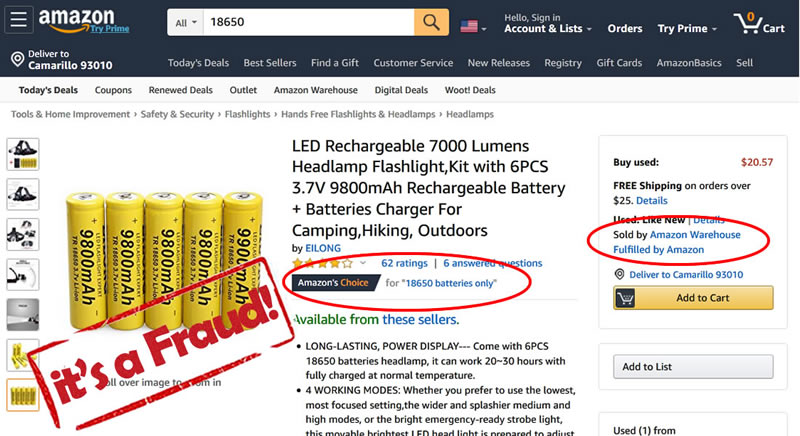Your Amazon Purchase May Have Come From The Trash
Discarded garbage offered as new items on Amazon's website
December 19, 2019 - Los Angeles, CA – Consumers have a strong incentive to avoid Amazon, they may be buying other people's trash. Amazon allows unvetted third-party marketplace sellers to list just about anything they want, including counterfeit, fake, replicas, and even someone else's garbage. Sellers are doing just that and shipping the items to Amazon's Fulfilled by Amazon ("FBA") worldwide distribution centers to hide the origin and create the illusion the items are sold by Amazon. Fraudulent and replica items may carry Amazon's coveted "Amazon's Choice" endorsement or Prime designations -- neither of which are assurances of quality, authenticity, or origin.
Dumpster diving investigative reporters from the Wall Street Journal conducted a revealing investigation of Amazon's deceptive, corrupt, and scam filled marketplace. The results are frightening.
WSJ reporters scoured dumpsters behind stores and a Trader Joe’s grocery, salvaging breath mints, sunflower seeds, marmalade, crispbread, fig fruit butter, olives, a headband, stencils, a Halloween mask, and Trader Joe's Lemon Curd. The WSJ reporters opened an Amazon seller account and mailed three recovered trash items to an Amazon Fulfillment Center to be sold to consumers. Amazon listed the items without questioning the inventory’s origins or sell-by dates.
“I myself ignored broken things more often than not” Chris Grantham told WSJ reporters. Grantham held several roles in Amazon’s fulfillment center in Ruskin, Fla., until 2017, including quality-assurance inspector. Amazon urged speed over precision, penalizing workers who didn’t hit productivity requirements, he said. Workers sometimes changed expiration dates for expired products in the computer, he said, so they wouldn’t be expected to perform a complicated disposal process -- a shortcut noted by several warehouse employees in a discussion reviewed by the WSJ. "Unless the product's on fire when we receive it, we would accept anything" said an ex-Amazon fulfillment employee.
Amazon customers don’t always have control over whom they buy from. A default setting in an Amazon account known as “commingling” can mean customers think they are buying from one merchant but end up getting products sourced from another. For instance, when another seller’s product is in a warehouse closer to the buyer.
The WSJ identified nearly 8,400 comments on 4,300 listings for foods, makeup, and over-the-counter medications with keywords suggesting they were unsealed, expired, moldy, unnaturally sticky, used, expired, or problematic in some other way.
The Counterfeit Report, an award-winning consumer advocate and industry watchdog, found dozens of Amazon listings for dangerous recycled fraudulent batteries listed as new and sold by third-party marketplace sellers, or sold directly by Amazon and featuring the "Amazon's Choice" banner.
For example;
The used 9800mAh fraudulent batteries shown below are sold and fulfilled directly by Amazon are have a fire and explosion risk. All 18650 batteries over 3800mAh are fraudulent -- there is no such product. China salvagers re-label the used unprotected batteries as "new" and sell them at cheap prices with wild capacity claims on Amazon.
Amazon prohibits the sale of ALL individual 18650 batteries; however Amazon is a direct seller of used customer returned fraudulent batteries.

Already plagued by a FTC review and U.S. Government Accountability Office (GAO) counterfeit investigation, allegations of bribes to employees, fake product reviews, data hacking and a cesspool of counterfeits, fraud, and scams, Amazon is no longer a safe choice for consumers. Even if consumers wisely avoid Amazon, they are still at risk of injury or death from other shopper's counterfeit and fraudulent product purchases.
Through huge legal loopholes and virtually immune to prosecution, IP laws, and safety standards, Amazon continues to enable and facilitate criminal activity while profiting from counterfeit sales which destroy manufacturers, deceive consumers, and destroy jobs and public trust. Amazon takes a transaction fee for each item sold, raking in $11.2 billion in profit in 2018 and $5.6 billion in 2017, but paid no federal income tax.
It's time for Congress to act.
Until then, consumers have the choice to shop elsewhere. The major retailers (Kroger, Costco, Home Depot, Target, Lowes, Best Buy, etc.) offer consumers competitive local and online purchase options, price matching, and prompt delivery.
 |